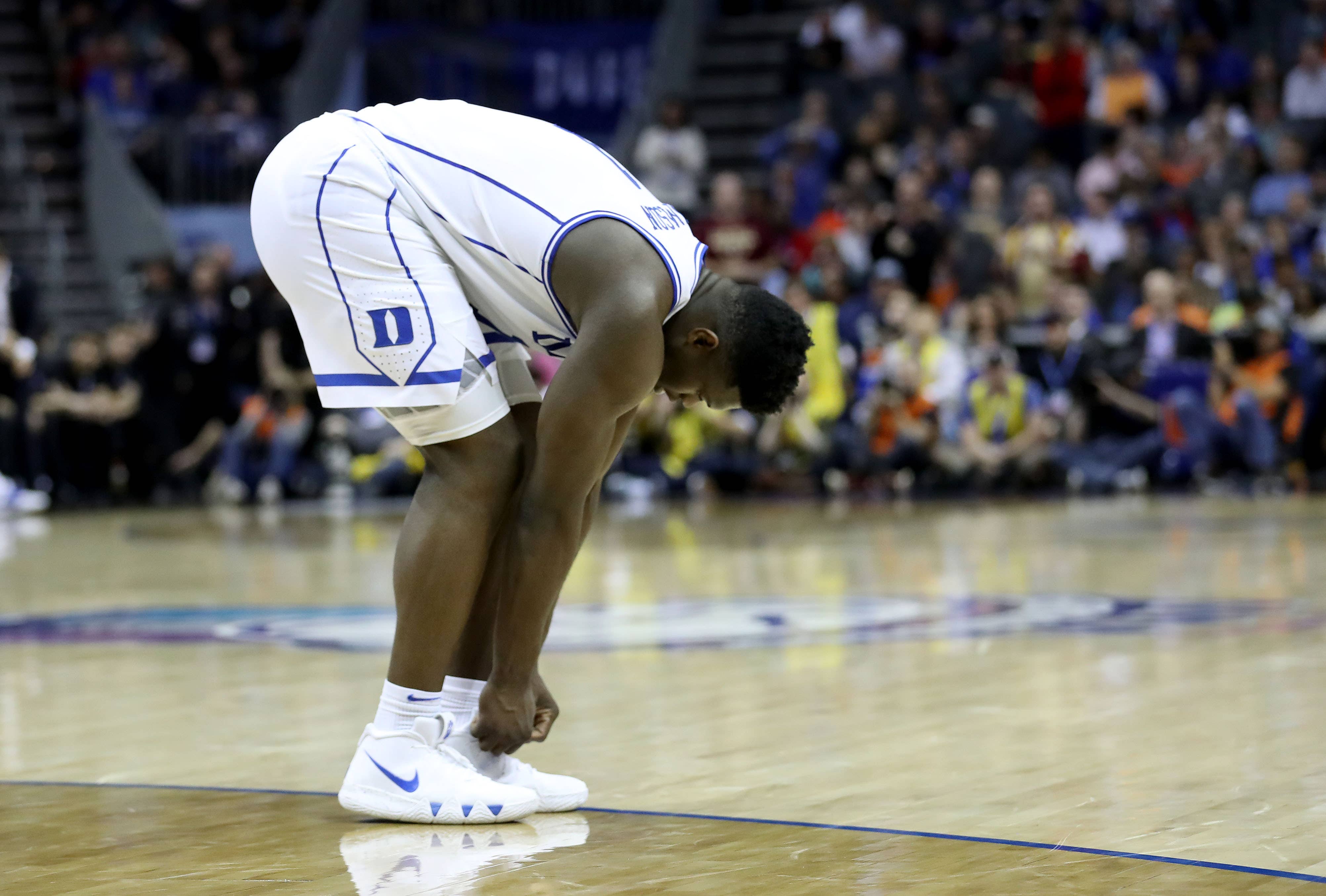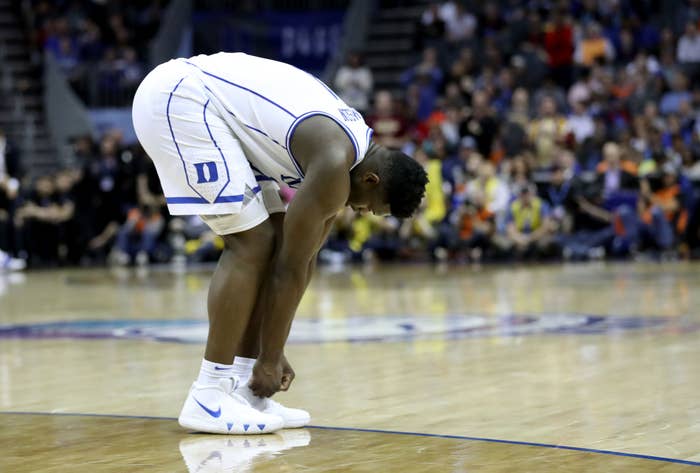
Imagine seeing a young basketball star from a top-tier Nike school go from wiping sweat off his Swoosh-laden jersey after a game-winner to posting a promo spot for Adidas hours later. As the NCAA publicizes a step toward allowing college athletes to earn cash for endorsements and promotions off their name, image, and likeness, this step may eventually lead to changes in the sneaker industry's relationship with college players.
The 31-page document the NCAA released this week lays out some basic plans for allowing this major shift for athletes, but it still uses the word "guardrails" aplenty in warning that the NCAA doesn't want their entire stranglehold on amateurism to fall apart. Within those guardrails, expect a mixture of status quo with sportswear brand-university relationships, slow shifts that could have brands signing athletes to early deals, and smaller companies entering the scene.
"If I'm one of those other companies, a new company, or a Chinese company, I'd get everybody on a team to wear the shoe when the game was over, that would be OK with me," says Sonny Vaccaro, the sports marketing guru who was instrumental in the rise of sneaker contracts in basketball during stints with Nike, Adidas, and Reebok. "That will be something."
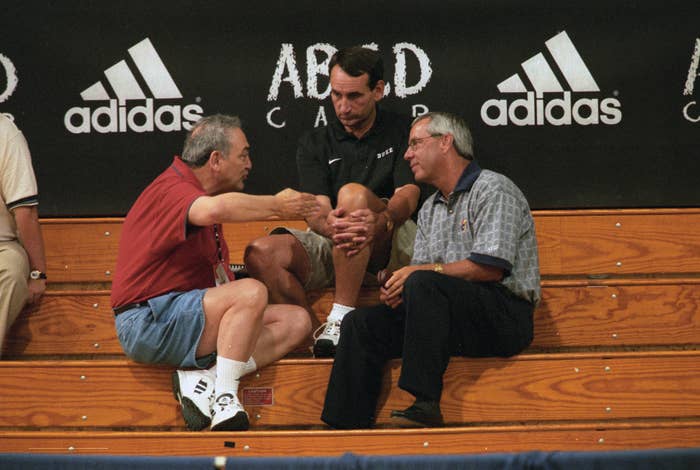
The Early Guardrails
Dave Ridpath, a professor of Sports Management with Ohio University and part of the Drake Group, a think tank focused on academic corruption in college sports, says the language in the NCAA announcement makes it clear that athletes won't be allowed to endorse products while representing the school that go against a school contract. But it leaves open the possibility of an athlete endorsing products outside of competition. So, for example, an athlete playing basketball at Duke, a Nike school, couldn't wear Adidas during the game or a school-held press conference. But on social media and around campus? That could be an entirely different story.
That guardrail—one supported even by the most ardent supporters of fully opening endorsement deals—doesn't seem likely to change. To go with, questions on having a cap on how much athletes can pocket from endorsement deals have surfaced.
"At Drake, we proposed having a third-party verification system to determine fair market value," Ridpath says. "If someone says, 'I will give you a $1 million to stand at the car dealership for the day,' I think you need to ensure a fair market value."
While bringing in transparency to the endorsement process and, ideally, limiting shady recruiting deals, Ridpath suggests taking compliance out of individual schools and moving it to a third party. "I'd love to see an open market with no restrictions, but I also understand there needs to be minimal oversight," he says. "Right now, the black market is very easy to exist in, and this could bring it above board."
Michael V. Drake, chair of the NCAA Board of Governors and president of Ohio State, says that "allowing promotions and third-party endorsements is unchartered territory."
This all, then, becomes a first step, and one Vaccaro says he's elated for. He also cautions that the NCAA may simply be running a "four-corner offense to stall the game" and continue to hold off any advancement of allowing athletes to own their individual rights. But if they follow through, expect changes.
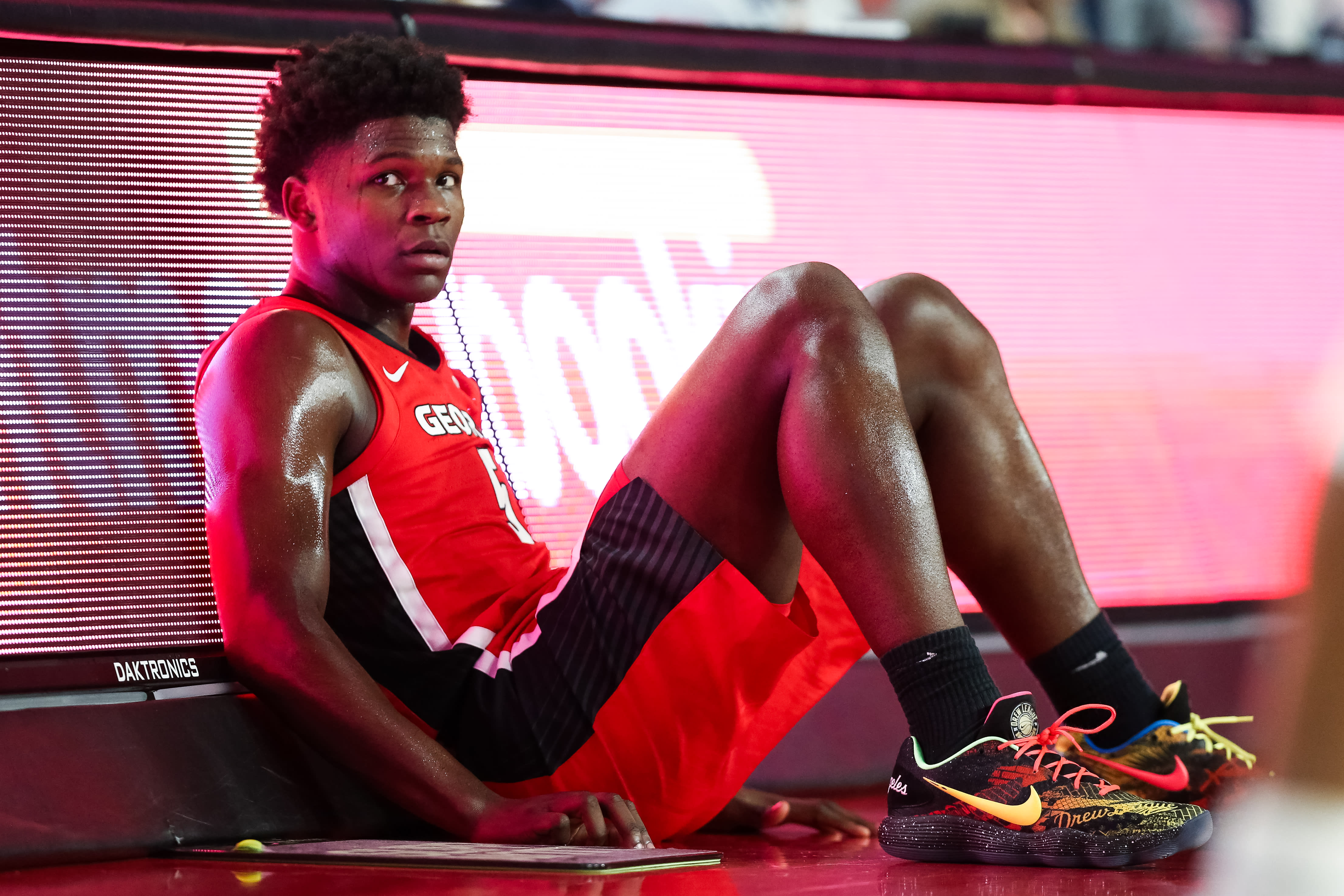
The Athlete Perspective
"I would sign every player I could and have them throw sweat suits on once the game is over," Vaccaro, the man behind signing Michael Jordan, says about brands working around the school contracts. "It is saying this kid is so valuable we are willing to give him money to wear the product when they are not playing. I think that would happen."
Jeff Schwartz, founder and president of Excel Sports Management, one of the largest basketball-rich sports agencies in the country, says he doesn't anticipate the model changing how sneaker companies and universities coexist. "I think the relationships colleges have with the shoe companies will remain status quo," he says. "The deals are overarching school deals. If a school is a Nike school, it is not going to affect the responsibility the player has for the school and will have to be in Nike sweats and Nike shoes. It is not going to change."
What could change, though, Schwartz says, is the opportunity for Puma, Under Armour, New Balance, and Chinese brands to get involved with an athlete they feel has a big future in a more unique way. "There are other things they can do with the athlete, they can monetize their social media," Schwartz says. "Brands could do other things around the school, but you have to be willing to say that when the athlete is actually playing the sport, they won't be in our product."
In basketball, where the cultural and lifestyle angle plays heavily, athletes may have the greatest advantage to sign deals not coinciding with a school's contract, says Erin Kane, an Octagon agent representing players in the NBA and WNBA. Having an athlete able to sign their own deal changes the set-up and value, but it is simply too early to know how much, she says.
Then there's the option for an athlete already playing in a brand's product to sign their own deal beyond the school and create their own commercial activities outside the season. "We think that is the best compromise," Ridpath says. "You don't want to restrict a player's ability to make money, but we think it is reasonable to say you need to abide by school contracts and have the rest of the year to abide by your own deals. Some players will have their own deals that go with team deals."
Even still, Schwartz doesn't expect sneaker companies to clamor to sign a slew of players to major deals. There will always be one or two players every few years that shoe companies want to sign as soon as possible—if the same brand as the school contract, it opens up potential for a signature shoe much sooner—but that "is not going to be the norm." Add in the expected abolishment of the one-and-done by 2022 and we may never see the most sought-after young players even attend college.
The biggest winners, in Vaccaro's mind, will be women athletes able to show their marketability in the college spotlight. "I think tomorrow morning or next week sometime, these girls are going to wake up and say, 'Damn, we are more marketable than we have ever been,'" he says. "The girls are the new trailblazers. Title IX is still in effect and the individual, or maybe two or three on a team, are going to be meaningful. The girls are nationally known names now, and they are viable candidates to be paid the same as the boys."
Kane agrees, saying that some of the youngest players, those graduating from high school now, the Hailey Van Lith and Paige Bueckers types who already have a strong social following before college, have an opportunity to capitalize on that following. And with the longer runway of time female players remain in college as per the CBA, the endorsement rules could have impacts on starting the agent-player relationship earlier.
"It raises so many questions of how young we are going to start cultivating these relationships," Kane says. "I'm on the side of athletes being able to benefit from the hard work they have put in for years and years, and if the school or NCAA is making a ton of money, the student should be able to participate in that. The biggest questions are the value of these contracts and how early shoe companies are able to create a contractual relationship with a player."
Nike and Adidas both declined to comment for this article.
While major contracts come few and far between, Ridpath says there remain plenty of smaller opportunities for players. He used Joe Burrow as an example, a quarterback who lives just a few blocks from Ridpath in Ohio, about how when Burrow was still just a backup at Ohio State, he could have easily made valuable endorsement money in his hometown. This localized popularity can extend to a lot of areas. A college athlete also seen as a YouTube influencer, for example, could be pushing product, whether locally or to a larger audience. Ridpath also wouldn't be surprised to see existing firms and new companies sprout up looking to manage college athlete's brands.
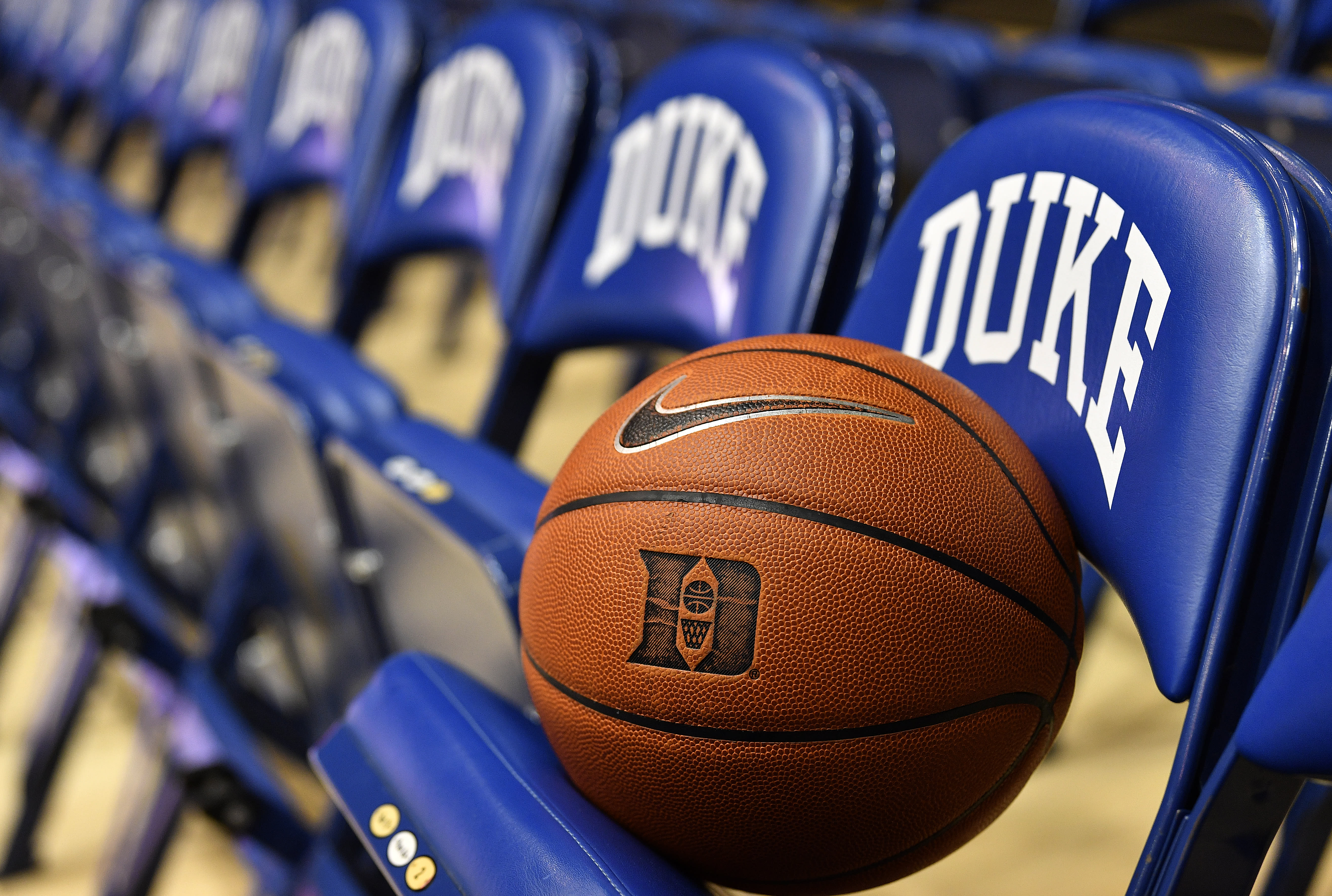
The School Perspective
Schwartz says his initial reaction is that, yes, brands may have added pressure to lock in schools so they don't have blue chip players going to a school playing in a rival brand. He also expects a potential shift in marketing school programs—and written into contracts—that rely on a brand's marketing budgets for greater program promotion and branding to help promote players individually, another avenue to attempt to lure a student to a particular school.
Vaccaro recounts a story of sitting with Kobe Bryant in an Italian restaurant in New York after they announced his signing with Adidas in 1996. "He says, 'Mr. Vaccaro, what if I had gone to Duke, could you have signed me to a shoe contract?' I said, 'No, Kobe, we would have had to do it with Duke,'" he says. If Bryant had gone to Duke (a Nike college) that Adidas deal couldn't have happened until later. Vaccaro adds that shoe companies will want to make deals with players when they aren't with schools, like Jalen Green signing as he enters the G-League. That provides the most flexibility for the brands.
The belief that the NCAA will load the final rules with as many restrictions as possible to ensure money for the NCAA, Ridpath says, means the schools will have a strong position.
Jennifer Duncan, spokesperson at Learfield IMG College, one of the largest college licensing agencies in the country, says they are continually looking at the ongoing issue. "Our role will be to assist our university partners once there's a more move-forward outcome," she says.
The schools and companies won't miss out. "This is not a popularity contest, this is a selling product contest," Vaccaro says. "You pay for the one that the public wants to just love and buy. The companies that sign schools will not lose. They are going to protect the contract."
Through it all, Kane says, "This, honestly, has opened up more questions than answers."

